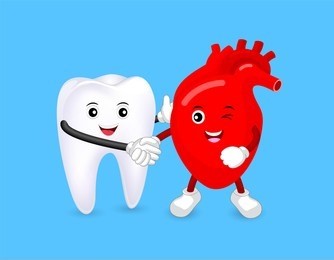Maintaining good oral health is essential for more than just a bright smile and fresh breath—it plays a significant role in your overall health and wellbeing. Recent research has revealed a strong connection between oral health and heart disease, suggesting that the state of your teeth and gums can impact the health of your heart. Understanding this link is crucial for taking proactive steps to protect both your oral and cardiovascular health. In this blog, we’ll explore the relationship between oral health and heart disease, the risks involved, and how to safeguard your health.
Understanding the Link: Oral Health and Heart Disease
The mouth is home to a diverse community of bacteria, some beneficial and some harmful. When proper oral hygiene is not maintained, harmful bacteria can accumulate, leading to infections such as gum disease (periodontitis). Gum disease is a serious condition that affects the gums and the structures that support the teeth. If left untreated, it can cause tooth loss and contribute to the development of other health issues, including heart disease.
How It Happens:
- Bacteria and Inflammation: The harmful bacteria in your mouth can enter your bloodstream through the gums, especially if you have gum disease. Once in the bloodstream, these bacteria can attach to fatty deposits in the arteries, leading to inflammation and contributing to atherosclerosis (the hardening of the arteries).
- Blood Clots: Inflammation caused by oral bacteria can also increase the risk of blood clots, which can block blood flow to the heart and lead to a heart attack.
- Endocarditis: In some cases, oral bacteria can infect the inner lining of the heart (endocardium), leading to a condition known as endocarditis. This is particularly dangerous for individuals with pre-existing heart conditions.
The Role of Gum Disease in Heart Health
Gum disease, particularly its advanced form (periodontitis), has been linked to an increased risk of heart disease. Periodontitis causes chronic inflammation in the gums, which can have far-reaching effects on the body. The inflammation doesn’t just stay confined to the mouth; it can spread and trigger inflammatory responses elsewhere in the body, including the cardiovascular system.
Key Risk Factors:
- Inflammation: Chronic inflammation is a significant contributor to both gum disease and heart disease. When the gums are inflamed, it can lead to systemic inflammation, increasing the risk of heart-related problems.
- Plaque Buildup: The same type of plaque that forms on your teeth and gums can also accumulate in your arteries. This arterial plaque can restrict blood flow and lead to heart attacks or strokes.
- Blood Sugar Levels: Individuals with diabetes are at a higher risk of developing gum disease, and they are also more prone to heart disease. Poorly controlled blood sugar levels can worsen both conditions, creating a dangerous cycle.
Recognising the Symptoms of Gum Disease
Gum disease is often painless in its early stages, which is why it’s sometimes referred to as a “silent” disease. However, there are several signs to watch out for that may indicate the presence of gum disease.
Common Symptoms:
- Bleeding Gums: Gums that bleed easily, especially when brushing or flossing, can be an early sign of gum disease.
- Red, Swollen Gums: Healthy gums should be firm and pink. Red, swollen gums are a sign of inflammation and infection.
- Bad Breath: Persistent bad breath, even after brushing, can be a sign of gum disease.
- Receding Gums: If your gums are pulling away from your teeth, creating pockets, it’s a sign of advanced gum disease.
- Loose Teeth: Gum disease can cause the structures that support your teeth to weaken, leading to loose teeth or tooth loss.
Protecting Your Oral and Heart Health
Given the connection between oral health and heart disease, it’s essential to take steps to maintain good oral hygiene and prevent gum disease. By doing so, you can reduce your risk of heart-related issues and improve your overall health.
Tips for Maintaining Good Oral Health:
- Brush Twice a Day: Use a fluoride toothpaste and brush your teeth for at least two minutes twice a day. Pay special attention to the gum line to remove plaque and prevent gum disease.
- Floss Daily: Flossing helps remove food particles and plaque from between your teeth and along the gum line, areas that your toothbrush can’t reach.
- Regular Dental Check-Ups: Visit your dentist regularly for check-ups and cleanings. Professional cleanings remove tartar, which can contribute to gum disease.
- Healthy Diet: A balanced diet low in sugar and high in fruits and vegetables can help protect your teeth and gums. Foods rich in antioxidants and vitamins, such as vitamin C, can reduce inflammation and support gum health.
- Quit Smoking: Smoking is a significant risk factor for gum disease and heart disease. Quitting smoking can improve both your oral and cardiovascular health.
- Manage Stress: Chronic stress can weaken your immune system and make you more susceptible to infections, including gum disease. Practice stress management techniques to support your overall health.
Conclusion
The connection between oral health and heart disease is a powerful reminder of the importance of maintaining good oral hygiene. By taking care of your teeth and gums, you’re also taking steps to protect your heart and overall health. If you’re concerned about your oral health or suspect you may have gum disease, it’s crucial to seek professional care.
For expert advice and comprehensive dental care, visit 32 Pearls Dental Surgery. Our experienced team can help you maintain optimal oral health, reducing your risk of gum disease and its potential impact on your heart. Don’t wait—schedule an appointment with 32 Pearls Dental Surgery today and take control of your health!

